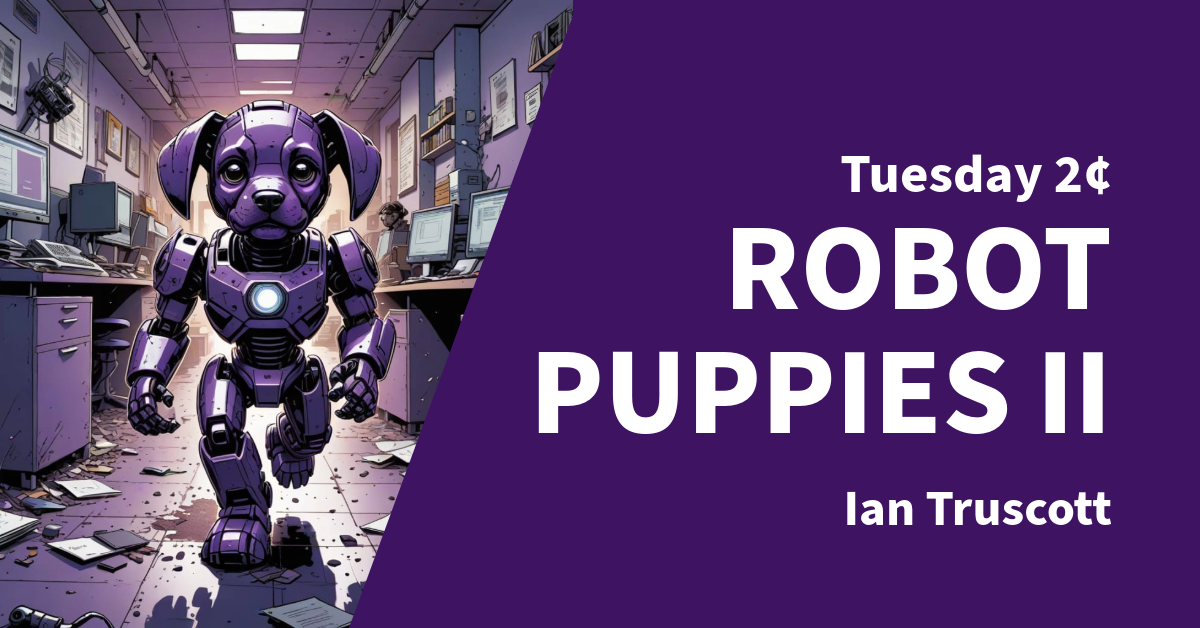Tuesday 2¢ - Robot Puppies II
I continue to yap on about puppies, free beer, AI tools, and martech from last week's post...

I continue to yap on about puppies, free beer, AI tools, and martech from the cutting room of last week's post...
Last week (in this Tuesday 2¢) I talked about whether your chosen robot companion or AI technology was a free puppy, in that adopting it is going to take some effort, feeding, training, and exercising it, or if it was a free beer, in that with minimal effort, your day is markedly improved with zero effort on your part.
I like to keep these 2 cents posts somewhat pithy, so I chopped out some ideas I was going to expand upon. However, I got into this topic with a chum (Robert Rose on my podcast), and I thought I’d share what I discarded.
The example in my last post was one of these growth hack tools that sounds like some “get rich quick” bullshit by suggesting you can bin your SDR team for an AI at no cost to your business (aside from the monthly subscription).
The truth of course is that it might be useful, it may enhance your business development productivity, but it’s a free puppy, it’ll do nothing, or maybe shit everywhere (or over your audience) if you don’t put the work in.
Like any marketing technology over the last two decades, if your basic processes and approach are broken, it’ll only fuck things up faster and at scale, it won’t solve the problem.
Actually - that wasn’t the point I concluded with last time; it was that these technologies are not magically eliminating the work but moving the effort around.
But that’s not the hobby horse I was inviting you here to ride around on, I wanted to explore the broader sense that in the workplace, this is also true.
Let’s take the task I am doing now, writing this.
I am hearing more use cases where content creators are spending more time creating content, as they utilize ChatGPT as a research assistant. This opens up their writing to the opportunity to explore more topics in greater depth, test ideas, and produce better content, rather than creating faster or cheaper content.
“You had access to the world's knowledge through ChatGPT, and you produced that,” says the voice inside your head.
Additionally, we are all developing a good eye for synthetic content; we believe our audience has too, and content creators are sensitive to this, working harder to avoid sounding like the B2B robots that (ironically) we’ve probably always sounded like.
It’s much harder to write something with personality than to engineer a vision for the leading, innovative, AI-driven, data-led doohickey that will shift a paradigm, once you’ve leveraged the low-hanging fruit, of course.
In the simple example of this post, I have probably spent more time arguing with my overreaching robot editor, which has learned nothing about my writing style (or lack thereof), as I try to make this worth reading, sounds like me, and has some, well… joy?
Maybe not joy exactly but, some something.
I suspect it’s a similar story in product development and “vibe coding.”
Having led product development teams in the past, I have the notion that it’s not writing fresh code that kills you, but rather testing, refactoring, optimizing, supporting new frameworks, and all of that. And, of course, the robot is not going to come up with the creative idea in the first place.
So, I gave my robot research assistant a poke and started down this rabbit hole. According to various sources that it picked (such as this from SonarSource), developers spend 35-60% of their time not writing fresh code, but designing, fixing, optimizing, and updating the existing stuff, especially when it comes to security, scalability, and resiliency.
And it doesn’t matter who wrote the code, whether there was vibe, a person, or a machine, the puppy still needs training and someone to clean up the mess.
Maybe that’s quite enough about puppies, but it's interesting to see how this develops. What's been your experience? Is AI giving you puppies or beer?
One last thought: has anyone added up the hours of human labor that have gone into all these AI conferences? Would that offset the jobs lost to AI so far?